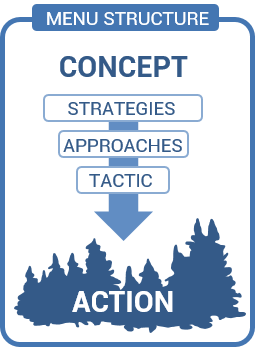The Northern Institute of Applied Science has led the development of adaptation strategies and approaches for a variety of natural resource topics, which can be used with the Adaptation Workbook. These “menus” provide a curated list of adaptation actions to help you move from broad ideas to specific actions. Although menu items can be applied in various combinations to achieve desired outcomes, not all items on the menu will work together. Furthermore, actions that work well in one ecosystem type may not work in another; it is up to the land manager to select appropriate actions according to project location and goals. Learn more about the workbook. All menus are peer-reviewed, interact with menus in the links below, and find supporting publications at the Climate Change Response Framework (forestadaptation.org).
These resources were designed for the Midwest and Northeast U.S., and are a product of a synthesis of academic literature and widespread input from the management community. However, these tools may be useful in other regions as well. Adaptation actions for other regions are also available through the USDA Forest Service Climate Change Resource Center.

Browse Menus of Adaptation Strategies and Approaches, by topic:
Forest Strategies and Approaches
Developed for forested ecosystems, with focus on forest management and planning.
Urban Forest Health Strategies and Approaches
Developed for communities working in urban ecosystems. This version is supplemental to the 2016 version of the Urban Forest Strategies and Approaches menu, found here.
Forested Watershed Strategies and Approaches
Developed for water resources management; with focus on hydrology, vegetation management, landscape planning, and infrastructure.
Forest carbon Management Strategies and Approaches
Designed to help natural resource professionals devise actions that can maintain existing carbon stocks or enhance sequestration capacity while providing co-benefits for other sustainable resource management objectives.
Non-forested Wetland Conservation and Management Strategies and Approaches
Developed for non-forested wetland conservation and management.
Recreation Strategies and Approaches
Developed to help managers manage recreation experiences, and the infrastructure that supports it in a number of ways.
Agriculture Strategies and Approaches
Developed to assist agricultural producers, specialists, and technical service providers.
Wildlife Management Strategies and Approaches
Developed to assist wildlife managers.
Other Menus
Find all published strategies and approaches, and supporting publications at the Climate Change Response Framework (forestadaptation.org)
Additional topics available:
- Tribal perspectives
- Other topics that are in development: wildlife, fire adapted ecosystems, grassland, coastal (freshwater and sea-level rise)
The adaptation strategies and approaches can provide:
- A full spectrum of possible adaptation actions that can help sustain healthy ecosystems and achieve management goals in response to climate change
- Opportunity to inspire thinking and spur brainstorming for adaptation planning
- A menu of adaptation actions from which managers select actions best suited to their specific management goals and objectives
- A platform for discussing climate change related topics and adaptation methods
- Examples of tactics that could potentially be used to implement an approach, recognizing that specific tactics will be designed by the land manager.
The adaptation strategies and approaches do not:
- Make recommendations or set guidelines for management decisions. It is up to the land manager to decide how this information is used.
- Express preference for any strategies or approaches within an ecosystem type, location, or situation. Rather, a combination of location-specific factors and manager expertise is needed to inform the selection of any strategy or approach.
